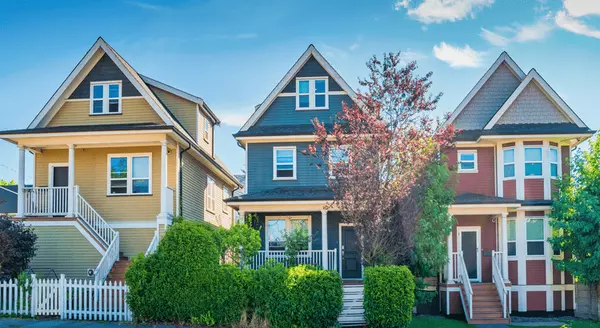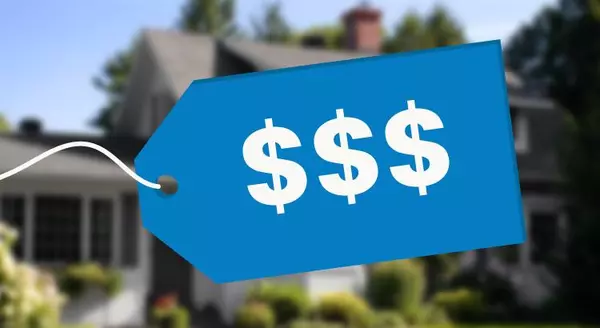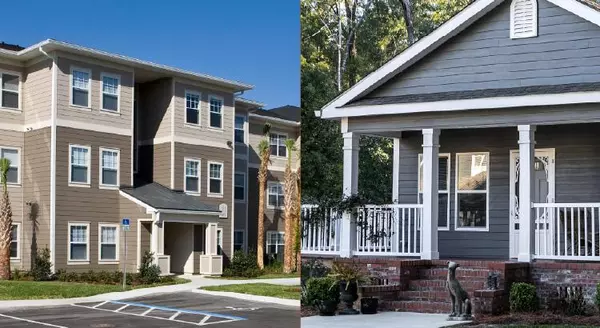What the Historically Low Mortgage Rates Mean for Homeowners

Originally posted on 2/8/2020.
For the first time in US history, 30-year fixed mortgage rates fell below 3% in July.1 Many homeowners and homebuyers are excited about the low rates and hurry to take advantage of the situation while it lasts. Others question whether or not these low rates are a genuine bargain.
Freddie Mac has tracked the 30-year mortgage rate since 1971. Back then, the average was 7.31% in the US.2 As inflation went up in the mid-1970-es, so did the mortgage rate. By 1981 a 30-year fixed mortgage would cost as much as 18.63%.3 So while the mortgage rate has been hovering around the 4 - 5% mark in recent years, it is worth remembering that it has not always been this low.
As inflation started to normalize toward the end of 1982, so did mortgage rates. By 2012 rates had reached a low of 3.31%, only to begin to go up again. However, this time at a more modest rate than in the late 1970-es/early 1980-es. The most recent peak was reached in 2018 when mortgage rates climbed to 4.94%.4
Why are today's interest rates dropping so much? The answer is relatively simple; economic uncertainty.
Bond yields and mortgage rates are intimately connected because most US mortgages are bundled and sold as bonds. As uncertainty rises and stocks perceived as a higher investment risk than bonds, investors shift their investments to bonds. When more money flows to the bond market, interest rates go down as investors are willing to accept lower returns.5
The effect that economic uncertainty can have on interest rates was perhaps most clearly seen in Europe last year. Uncertainty over the impact of Brexit drove the ECB rate below zero. The result? 20-year mortgages at zero percent interest rate and 15-year mortgages at minus 0.5% before fees.6
The current pandemic is creating a very similar situation in terms of economic uncertainty. The uncertainty of the US economy's future, not to mention the world economy, drive investors from the stock market to low-risk bonds, pushing interest rates downward.
The National Association of Realtors Chief Economist Lawrence Yun, claims that "the number one driver of low mortgage rates is the accommodating Federal Reserve stance to keep interest rates low and to buy up mortgage-backed securities." He continues, "we will see mortgage rates stay near this level for the next 18 months because of the significance of the Fed's stance."7 Given the current economic climate, it is more likely that rates may continue to drop, though.
Where Is the Benefit to Homeowners?
Home prices are reciprocally affected by mortgage rates. So, when interest rates go down, home prices go up. Why is this? Because lower rates make homes more affordable, thus sparking buyer demand. Even if you are not planning on selling your home, you can benefit from the lower interest rates.
Many homeowners are taking advantage of the low rates by refinancing their existing mortgages. Refinance applications have surged over the past few months because the current rates can save homeowners large amounts over the lifetime of their mortgage and reduce the monthly payments here and now.8
In the chart below, you can see roughly how much a one percent decrease in your mortgage rate can save you on a 30-year fixed-rate mortgage.
Estimated Monthly Payment On a 30-Year Fixed-Rate Mortgage
|
Loan Amount |
4.0% |
3.0% |
Monthly Savings |
Savings Over 30 Years |
|
$100,000 |
$477 |
$422 |
$55 |
$20,093 |
|
$200,000 |
$955 |
$843 |
$112 |
$40,184 |
|
$300,000 |
$1,432 |
$1,265 |
$167 |
$60,277 |
|
$400,000 |
$1,910 |
$1,686 |
$224 |
$80,368 |
|
$500,000 |
$2,387 |
$2,108 |
$279 |
$100,461 |
Before you decide if refinancing is an option for you, you'll need to factor in any pre-payment penalties on your existing mortgage and closing costs on the new mortgage. A refinance may cost you as much as 2 - 5% of your loan amount in fees.9 To get an indication of how long it will take you to recoup the costs, you can divide the costs by your monthly savings, or you can use an online refinance calculator. If you would like a more precise calculation, you should speak with a mortgage professional. If you do have one, we are happy to connect you with one from our network.
Where Is the Benefit to Homebuyers?
You have already seen how the low interest rates will save you money on your monthly mortgage payments. However, they may also help improve your buying power. Let's assume that you can afford a monthly mortgage payment of $ 1,500.00.
At a 30-year mortgage rate of 5%, you will be able to pay $ 279,000 for a home. If the rates dropped to 4%, that same monthly payment would pay for a home costing $ 314,000. That's an increase in buying power of $ 35,000.
If we take the example a little further and assume the mortgage rates dropped to 3% for a 30-year fixed-rate mortgage, you would now be able to afford a home at $ 355,000, improving your original buying power a whopping $ 76,000. Today's low mortgage rates may help you if you have been priced out of the market previously.
Reversely, rising mortgage rates may diminish your buying power significantly. By waiting to buy, you may find yourself having to settle for a smaller home in a less desirable neighborhood. So, if you are planning to move house, now may be the right time for you.
What about rising home prices as a result of the lower mortgage rates? Low interest rates are indeed pushing home prices upward. But it is essential to know that home prices generally lack behind the drops in mortgage prices, making it more relevant to take advantage of the falling interest rates early on, before the home price rises too much.
Could Mortgage Rates Go Even Lower?
Many factors impact mortgage rates, making it impossible to predict the future of mortgage rates. A lot depends on the trajectory of the COVID-19 pandemic and the subsequent economic impact. Not just here in the US but the rest of the world. The upcoming election here in the US will most definitely also affect mortgage rates.
The Mortgage Bankers Association and Freddie Mac expect rates to be between 3.2% and 3.5% in 2021.10,11 At the same time, Fannie Mae is predicting rates as low as 2.8% next year.12
The truth is that mortgage rates could go below 1% next year or rise above 5%. No one truly knows. We know that mortgage rates are currently unprecedented low, so holding out for even lower rates could mean that you could be missing out on the deal of a lifetime. And the good news? If rates do fall below 1% or 2% next year, you can still refinance when it happens.
How To Secure the Best Available Mortgage Rate
The average 30-year mortgage is around 3%, but you can find advertised rates lower than that. These very low rates are usually reserved for prime borrowers. If you do not automatically qualify for the ultra-low rates, here are some steps you can take to improve your rate:
Consider a shorter mortgage term
You can lock in an even lower rate by choosing a 15-year or shorter mortgage term. If you can afford a higher monthly payment, a 15-year mortgage can save you a bundle in the long run, and you will pay off your home in half the time.13
Boost your credit score
During an economic downturn, lenders become more cautious. Today, you will probably need a 740-score or better to secure your lenders' best rates.14 There is no quick-fix for a low credit score. However, there are things you can do to improve your score before applying for a loan.15
- Dispute inaccuracies in your credit report
- Pay your bills on time and make sure you catch up if you are behind
- Don't take our new lines of credit or loans
- Pay off your debt and keep credit card balances as low as possible
- Don't close credit cards you are not using, unless they cost you annual fees
Make a larger down payment
The more equity you have in your home, the lower the risk that you will default on your loan. This is the reason lenders offer better rates to borrowers with larger down payments. If you can manage a downpayment of 20% or more, you will not have to pay for private mortgage insurance.
Buy down the rate
By paying a fee to your lender, you can reduce the interest rate of your mortgage. This fee is known as points. Points are not cheap, but as they reduce the interest rate for the life of your mortgage, they may be worth considering.
Check the market
There can be a significant variation in rates, fees, and other terms between lenders, so it is always worth speaking with several lenders. As long as you can complete the process within 45 days, it will not affect your credit score.16
|
READY TO EXPLORE YOUR OPTIONS? Mortgage rates are historically low, so don't miss out on this opportunity to lock your mortgage rate in at a great rate. Whether refinancing or buying a new home, we are here to help. Let us connect you with a trusted mortgage professional in our network. If you are ready to shop for a new home, we are ready to assist you with your search - at absolutely no cost to you! Contact us to schedule a free consultation. |
This article references an opinion and is for informational purposes only. It is not intended as financial advice. Consult a financial professional for advice regarding your individual needs.
Sources:
- CNN Business - https://www.cnn.com/2020/07/16/success/30-year-mortgage-rates-record-low/index.html
- Freddie Mac - http://www.freddiemac.com/pmms/pmms30.html
- Value Penguin - https://www.valuepenguin.com/mortgages/historical-mortgage-rates
- Federal Reserve Bank of St. Louis - https://fred.stlouisfed.org/graph/?g=NUh
- Bankrate - https://www.bankrate.com/mortgages/how-interest-rates-are-set/
- NY Times - https://www.nytimes.com/2019/12/17/business/europe-housing.html
- Washington Post - https://www.washingtonpost.com/business/2020/06/25/mortgage-rate-remains-historic-low/
- Yahoo! Finance - https://finance.yahoo.com/news/mortgage-refinancing-makes-big-comeback-151500346.html
- Bankrate - https://www.bankrate.com/mortgages/is-no-closing-cost-for-you/
- Freddie Mac June 2020 Quarterly Forecast - http://www.freddiemac.com/fmac-resources/research/pdf/202006-Forecast.pdf
- Mortgage Bankers Association Mortgage Market Forecast July 15, 2020 - https://www.mba.org/news-research-and-resources/research-and-economics/forecasts-and-commentary
- Fannie Mae July 2020 Housing Forecast - https://www.fanniemae.com/resources/file/research/emma/pdf/Housing_Forecast_071420.pdf
- Investopedia - https://www.investopedia.com/articles/personal-finance/042015/comparison-30year-vs-15year-mortgage.asp
- Money - https://money.com/mortgage-rates-below-three-percent/
- Experian - https://www.experian.com/blogs/ask-experian/credit-education/improving-credit/improve-credit-score/
- Equifax - https://www.equifax.com/personal/education/credit/report/understanding-hard-inquiries-on-your-credit-report/
Categories
Recent Posts










GET MORE INFORMATION


